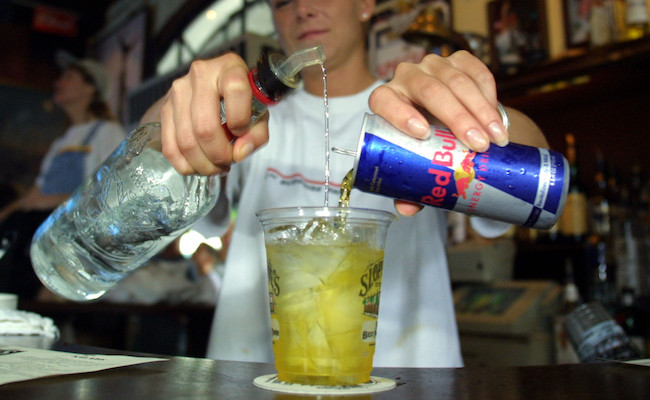
If you’ve been anywhere near a college in the last decade, you’ve probably come across the infamous cocktail of “Red Bull and Vodka”. The combination of the fizzy, medicinal tasting caffeinated beverage and high-proof vodka is a staple of frat boys and bros from coast to coast. Does it taste good? No, but it’ll definitely kick start your evening. The cocktail is pretty much the same recipe as the now outlawed original recipe for Four Loko and we’ve seen the headlines telling us that mixing caffeine and alcohol has the same affect on our brains as snorting a line of cocaine.
On top of that, we were told that mixing caffeine and alcohol is also a bad idea because we are likely to feel the effects of the alcohol quicker, leading to a lot of bad choices and regrettable late night texts. But, is the vodka and red bull really to blame? According to new research, that’s all in our heads.
Last summer, a study published in the science journal PLoS ONE indicated that when mice were given caffeine and alcohol the results were similar to the same mice given cocaine. Now, we don’t advocate giving “booger sugar” to mice, but if it’s for science who are we to judge? According to a new study published in the Journal of Consumer Psychology, the effects might not be all that bad after all.
Researchers studied 154 men of various ages and backgrounds. The participants were told they would be drinking a cocktail made up of vodka, energy drink, and fruit juice. All the drinks were the same, but they were labeled Red Bull and vodka, vodka cocktail, or fruit juice. Even though all participants drank the same mixture, those who believed they were drinking Red and vodka exhibited the highest levels of inebriation, confidence, and risk-taking.
“Red Bull has long used the slogan ‘Red Bull gives you wings,’ but our study shows that this type of advertising can make people think it has intoxicating qualities when it doesn’t,” lead author Yann Cornil told Science Daily.
Even though this study showed that the over-the-top results of mixing energy drinks and alcohol are due to the placebo effect, that doesn’t change the fact that mixing them could still lead to a bad night. Earlier this year The Journal of Studies on Alcohol and Drugs in Canada published a study showing that drinkers who mix caffeine and alcohol are more likely to end up making a bad decision and potentially injuring themselves than those who imbibe non-caffeinated alcoholic drinks. That’s because when you assume that drinking energy drinks and alcohol will mess you up more, it actually will.
“Essentially, when alcohol is mixed with an energy drink and people are aware of it, they feel like they’re more intoxicated simply because the marketing says they should,” added Cornil.
The most positive takeaway from the study is that participants who believed they were drinking Red Bull and Vodka were more likely to wait longer before getting behind the wheel. So, even though the effects might not actually be real, at least more people are making the right choice to stick around and have a glass of water before heading home.






